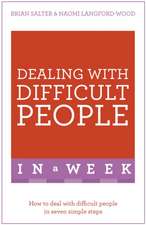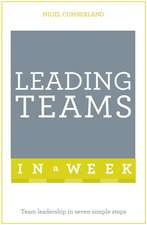Managing Knowledge Workers: Unleashing Innovation and Productivity
Autor A. D. Amaren Limba Engleză Hardback – 29 oct 2001 – vârsta până la 17 ani
Preț: 557.84 lei
Preț vechi: 799.42 lei
-30% Nou
Puncte Express: 837
Preț estimativ în valută:
106.74€ • 110.12$ • 89.08£
106.74€ • 110.12$ • 89.08£
Carte tipărită la comandă
Livrare economică 27 martie-10 aprilie
Preluare comenzi: 021 569.72.76
Specificații
ISBN-13: 9781567204483
ISBN-10: 1567204481
Pagini: 264
Dimensiuni: 156 x 235 x 25 mm
Greutate: 0.54 kg
Editura: Bloomsbury Publishing
Colecția Praeger
Locul publicării:New York, United States
ISBN-10: 1567204481
Pagini: 264
Dimensiuni: 156 x 235 x 25 mm
Greutate: 0.54 kg
Editura: Bloomsbury Publishing
Colecția Praeger
Locul publicării:New York, United States
Notă biografică
A. D. AMAR is Professor of Management at the Stillman School of Business, Seton Hall University. Also Director and Editor of The Mid-Atlantic Journal of Business, he has published more than 50 articles in other periodicals as well. He holds degrees in engineering and management engineering, an MBA from Baruch College, and a doctorate in business from City University of New York. Among his clients as a consultant at various times are General Motors, VW/Audi USA, the Social Security Administration and The Human Resource Administration of the City of New York.
Cuprins
PrefaceKnowledge OrganizationsKnowledge Organizations and EnvironmentAppendix 1-1: E-Business: Selection and Adaption of Products and Services for the Internet Commerce by A.D. AmarKnowledge WorkersSociology of Knowledge WorkersTraining, Learning, and Behavior Modification in Knowledge EnvironmentKnowledge Work and OrganizationMaking Knowledge Work a PleasureTeaming and Grouping Strategies: It's a SymbiosisKnowledge Work Organization and DesignManagement Functions in Knowledge OrganizationsMake Sure No One Decides for ThemLeading to be a LeaderKeeping Them Going: Motivation in Knowledge EnvironmentPutting Them in ControlAppendix 10-1: Controls and Creativity in OrganizationLifting Them Up: Combating Low Morale in Knowledge OrganizationsFuture of Knowledge OrganizationsKnowledge Organizations in the Twenty-First Century














